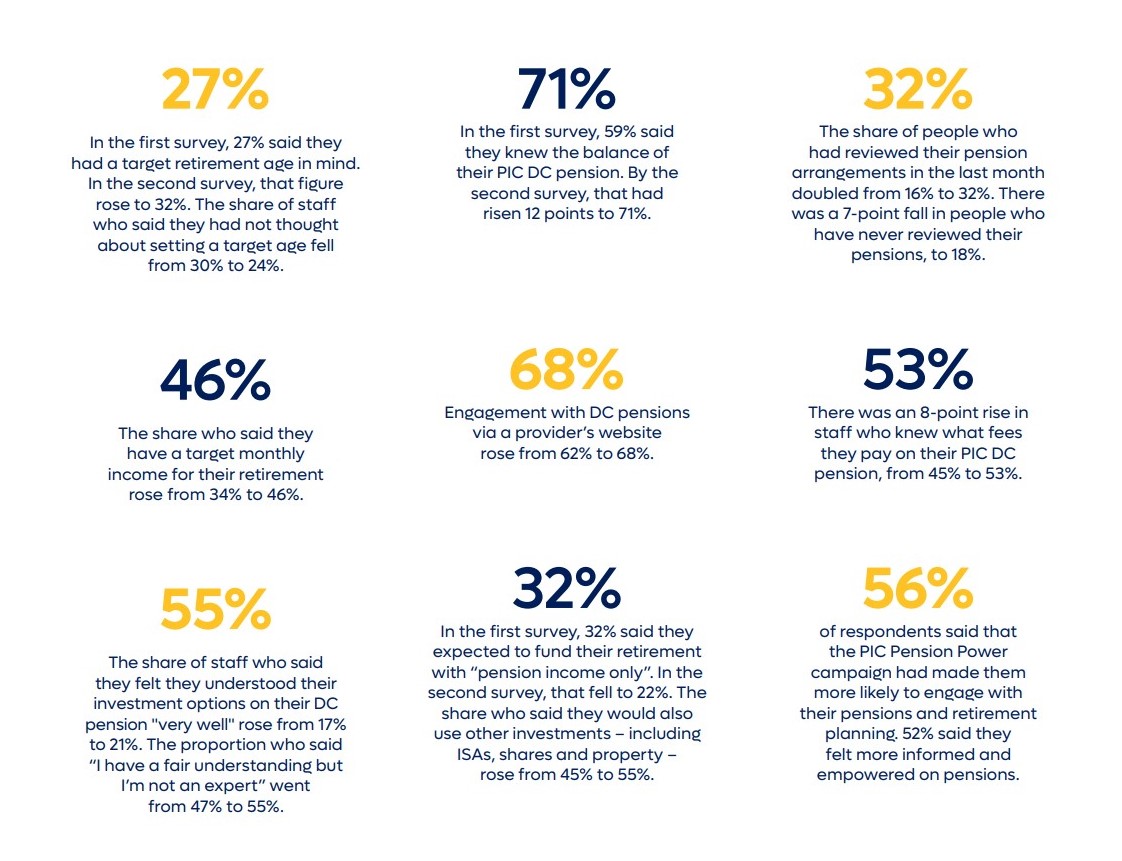About Us
Trustees
Policyholders
Purposeful investments
Sustainability
Investors
New & insight
Defined Contribution ('DC') saving pots should no longer be referred to as 'pensions' because they fail to meet the key definition of a pension – the provision of a regular income. The recommendation, which proposes using alternatives such as 'retirement funds' or 'later life savings', is contained in a new research report from Pension Insurance Corporation plc ('PIC'), a specialist insurer of defined benefit pension funds, based on the results of an internal pensions engagement campaign it ran with its 500 staff this summer. The campaign combined education and low-intervention support for employees to engage with their pensions with surveys and interviews to explore their knowledge of and attitudes towards pensions.
Tracy Blackwell, CEO of Pension Insurance Corporation, said: “Britain is in the middle of a generational shift around retirement funding as we transfer responsibility and uncertainty to individuals. That’s a huge change but it hasn’t been set out clearly to the public, and the way pensions and savings are described is an obstacle to better understanding of the reality of retirement funding today.
“We’ve had a huge shift in the systems we use to fund retirement saving. We now need a huge cultural shift to match it, learning from countries such as the US and Australia. Finding a new way to talk about defined contribution pensions, with employers taking a lead in financial education, would allow Britain to have a more honest and informed conversation about retirement funding.”
Laura Trott MP, Parliamentary Under Secretary of State at the Department for Work and Pensions, said: “I welcome this report, which usefully adds to our understanding of how people interact with and feel about their pensions. It makes interesting and important contributions to the debate around pensions and I hope it is read widely, especially by employers.
“Greater engagement with pensions and a more active, informed public debate about funding a better retirement are strongly in the public interest and I thank PIC for publishing research supporting those aims.”
An effective and novel intervention developed for PIC’s employees was the Five Day Challenge, a set of simple daily tasks that leave participants with an up-to-date list of all their pension pots, balances and access details. With an estimated 2.8 million DC pots worth around £27 billion considered 'missing' (according to the PPI in 2022) this simple act of updating records and retrieving “lost” pensions can deliver a non-trivial improvement in an individuals’ retirement prospects
The employee research revealed that even people who work in pensions feel unhappiness and disappointment at DC pensions’ fundamental inability to provide them with certainty about their retirement. Many focus group participants described feeling powerless over their retirement outcomes, because DC pensions do not deliver a predictable or guaranteed income.
However, the campaign demonstrated that it is possible to shift the savings culture. For example, the percentage of employees who reviewed their pension arrangements within the previous month doubled over the course of the campaign, going from 16% to 32% of employees. At the same time there was a seven point fall in employees who have never reviewed their pensions, to 18%.
-ends-

a. United States: In the United States, the term "retirement fund" is often used alongside "pension." The 401(k) plan, one of the most popular retirement savings vehicles, is often referred to as a "retirement fund."
b. Australia: The term "superannuation" is commonly used in Australia to describe retirement savings. It is similar to a retirement fund and refers to the compulsory and voluntary contributions made by individuals and employers to support retirement income.
c. Canada: In Canada, the terms "registered retirement savings plan" (RRSP) and "registered pension plan" (RPP) are commonly used to describe different types of retirement savings accounts.
d. Singapore: The Central Provident Fund (CPF) in Singapore is the primary retirement savings scheme and is often referred to as a "retirement fund."
e. New Zealand: The KiwiSaver program in New Zealand is a retirement savings initiative often referred to as a "retirement fund" or "superannuation scheme."
For further information please contact:
Pension Insurance Corporation
Jeremy Apfel
+44 (0)7966 138481
apfel@pensioncorporation.com
Apella Advisors
James Kirkup
+44(0)7815 706 601
jk@apellaadvisors.com
About PIC
The purpose of PIC is to pay the pensions of its current and future policyholders. PIC provides secure retirement incomes through comprehensive risk management and excellence in asset and liability management, as well as exceptional customer service. At half year 2023, PIC had insured 339,900 pension scheme members and had £44.9 billion in financial investments, accumulated through the provision of tailored pension insurance buyouts and buy-ins to the trustees and sponsors of UK defined benefit pension schemes. PIC has made total pension payments of almost £12 billion to its policyholders. Clients include FTSE 100 companies, multinationals and the public sector. PIC is authorised by the Prudential Regulation Authority and regulated by the Financial Conduct Authority and Prudential Regulation Authority (FRN 454345). For further information please visit www.pensioncorporation.com